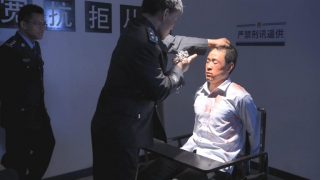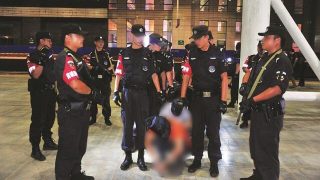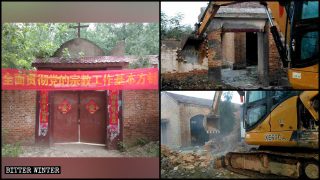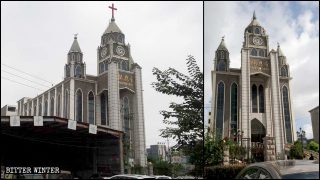Though approved by the government, Three-Self churches are not guaranteed protection from the state, and they often become targets of religious persecution.
by Zhang Wenshu
Even the deadly coronavirus outbreak did not reduce the speed of the cross-demolition campaign sweeping through China. In mid-March, crosses were removed from multiple churches in the eastern provinces of Jiangsu and Anhui. In the neighboring Shandong, the prefecture-level city of Linyi is no exception: On top of at least 70 crosses removed from churches since last spring, more have been taken down during the epidemic.
On February 3, a representative of the Zhuangwu town government in Linyi-administered Lanling county hired workers to remove the cross from a Three-Self church in Hexi village. He claimed that it would be unpleasant for his superiors to see the cross, and he could be dismissed from office because of that.
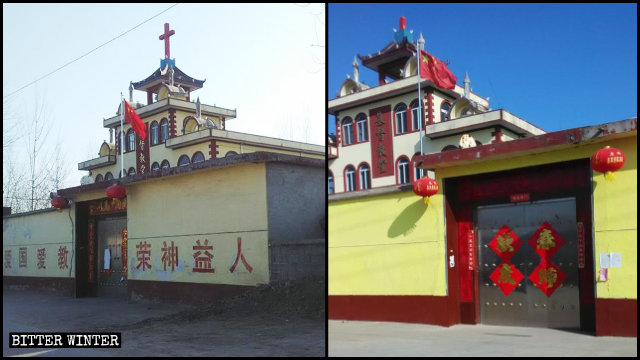
The church was built in 2007, and it has implemented the four requirements of the government’s religion “sinicization” campaign. It has also stopped all gatherings during the coronavirus epidemic. Despite its scrupulous compliance with state regulations, it still was not spared the crackdown.
“The government does not provide enough help during the epidemic but instead demolishes crosses,” a local believer complained.
Newly built and unused church targeted
Last August, the government of Linfen city in the northern province of Shanxi ordered to demolish the cross and the Chinese characters for “Christian Church” from a local Three-Self church. A congregation member told Bitter Winter that the church had never been used since its construction was finished in July 2018 because of a government-initiated conflict between the congregation and village residents. During the past year, the church director kept negotiating with the government, hoping to regain the right to use the church, but local officials continued shifting responsibility from one to another, repeating that “village residents do not allow believers to enter the church.”
“The government has the authority over the residents, not the other way around: officials are killing with a borrowed sword,” the believer said indignantly, citing one of the Chinese stratagems employed in war and politics when strengths of others are used to attack one’s enemy.
Despite the director’s several attempts to negotiate, the government continued demanding to repurpose the church and urged the congregation to remove the cross, or it would be “destroyed with explosives.” The cross was soon removed.
Video: The cross is being removed from a newly built church in Linfen
No cross can be higher than the national flag
Last December, numerous crosses were removed from Three-Self churches in Hegang, a prefecture-level city in the northeastern province of Heilongjiang.
A member of a church in the city’s Dongshan district told Bitter Winter that a local official threatened to close down the church if the cross was not removed because “it was higher than the national flag.”
Crosses of the Christ Gospel Church and the Luobei Christian Church in Hegang’s Luobei county were removed the same month using the same pretext. An employee in the county government explained that the crosses “were too eye-catching,” and they would “attract people into the churches.”
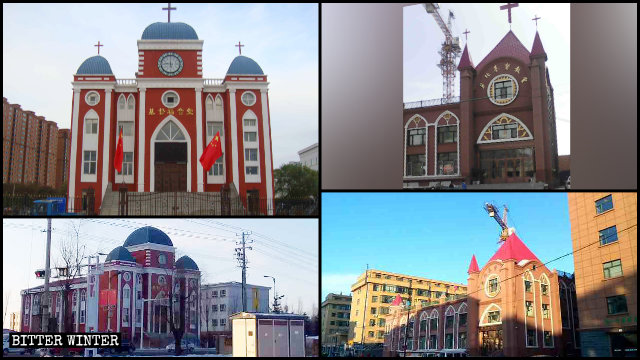
The Grace Church in Luobei is the only church for Protestants of Korean origin in the county. After its cross was removed, the church pastor encouraged his congregation that even though it had been physically removed, “the cross cannot be taken from their hearts.”
The cross is being taken off the Grace Church in Luobei county:
On November 8, 2019, some elderly believers tried to prevent the removal of the cross from the Ranfang Church in Gushi county in the central province of Henan. Government officials on the site told them that it was “the Communist Party that gives you food and money, not God.” Amid the commotion, a 70-year-old believer fainted to the ground.
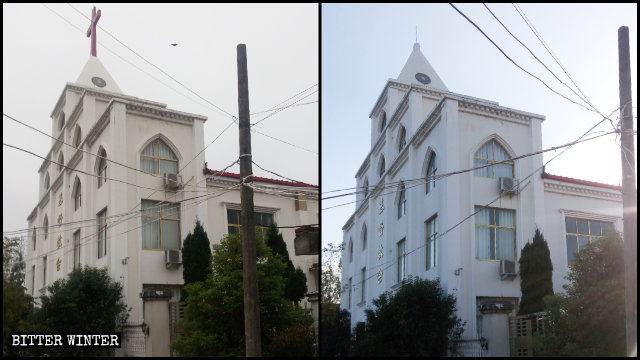
A congregation member said that ahead of the demolition, the government summoned the church director for “ideological work,” and officials from neighboring villages were brought in to maintain order. “How can we, common people, withstand these officials in power?” the believer lamented. “We had to restrain our anger and keep silent.”
Source: Bitter Winter
